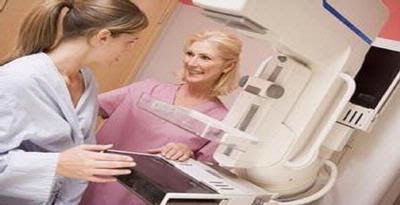Breast cancer is the second most cancer that strikes women after cervical cancer in Indonesia . Until now the exact cause is unknown , so we need early detection of cancer stage , which is stage zero by using mammography .
Patients with breast cancer patients is increasing every year . Based on data from the International Agencies for Research on Cancer ( IARC ) in 2005 , new cases in Indonesia is about 26 per 100,000 women per year , and mostly in a state of advanced stage .
Early detection is needed to find the zero -stage cancer patients on a low stage ( down staging) , so the percentage is likely to be cured high .
Mammography is a modality for early detection or screening for breast cancer using X-ray equipment is able to demonstrate abnormalities in the breast in the form of the smallest to less than 5 mm (stage zero ) .
Patients with breast cancer patients is increasing every year . Based on data from the International Agencies for Research on Cancer ( IARC ) in 2005 , new cases in Indonesia is about 26 per 100,000 women per year , and mostly in a state of advanced stage .
Early detection is needed to find the zero -stage cancer patients on a low stage ( down staging) , so the percentage is likely to be cured high .
Mammography is a modality for early detection or screening for breast cancer using X-ray equipment is able to demonstrate abnormalities in the breast in the form of the smallest to less than 5 mm (stage zero ) .
In stage zero , mammography can show the presence of microcalcifications , ie a lump that can not be felt either by the woman herself or the doctor though , to lump the size of 1 cm or more .
Stage zero is a pre -stage cancer , where the tumor mass has not come out of the milk glands and milk ducts ( LCIS or DCIS ) .
" When the zero stage can be detected , then the possibility of recovery is still very large , " said Dr. Sariningsih Hikmawati , Sp.Rad , Medical Staff Affairs Functional Dharmais Radiology Cancer Hospital , in lay counseling program entitled ' Benefits of Mammography Examination ' Cancer Hospital Dharmais
According to data from the Association of Indonesian Physicians Surgeons Oncology ( PERABOI ) in 2003, the prognosis of survival of breast cancer patients ( survival rate) per stage as follows :
Stage 0 ( not yet out of the tumor mass mammary glands and milk ducts ) : 10 -year survival 98 percent
Stage 1 ( mass of tumor is still confined to the breast ) : 5 -year survival of 85 percent
Stage 2 ( has no involvement of lymph nodes in the armpit ) : 5 -year survival of 60-70 percent
Stage 3 ( the mass of the tumor has spread to the muscle and the chest wall or lymph nodes above the supraclavicular ) : 5 -year survival of 30-50 percent
Stage 4 ( cancer has spread to other organs ) : 5 -year survival of 15 percent
Dr. Sari said , women over the age of 40 years recommended screening mammography every 1-3 years. This is because women over the age of 40 years is very at risk of developing breast cancer .
Other risk factors in women include :
Experienced menarche at age less than 12 years
Stop menstruation ( menopause ) above the age of 50 years
Do not have children
First pregnancy at the age of 35 years
Hormonal therapy
Had a history of previous benign tumor
Having a family history of breast cancer ( hereditary factors )
But Dr. Sari does not recommend screening mammography in women under the age of 35 years or who had not married . This is because at that age the breast still in a state of tight , and when done screening mammography can not reveal the maximum results due to the hormones are still closed .
However , screening can still be done for women aged under 35 years , by using ultrasonography ( USG ) . Unfortunately , the use of ultrasound we can not see any n -stage detection of microcalcifications or







0 comments:
Post a Comment